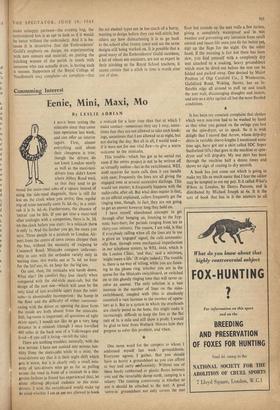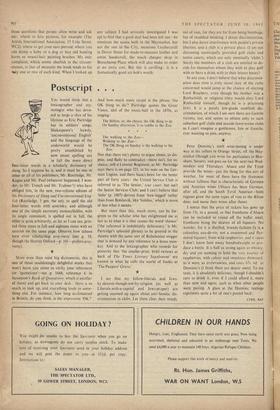Consuming Interest
Mo
Eenie, Mini, Maxi, By LESLIE ADRIAN I HAVE been testing the minicabs since they came into operation last week, and can offer an interim report. First, almost everything said about their cheapness is true; though the drivers do not know London nearly as well as the maxi-taxi- drivers (one didn't know where Abbey Road was), so that they tend to go round the main-road sides of a square instead of using the side-road diagonals, there is still far less on the clock when you arrive. One regular trip of mine normally costs 5s. 6d.-6s.; in a mini- cab it is 3s. 6d.-4s. Furthermore, the absence of 'extras' can be felt. If you get into a maxi-taxi after midnight with a companion, there is 3s. 3d. on the clock before you start : in a minicab there is only Is. And the farther you go, the more you save. Three people in a minicab to London Air- port from the centre of town comes cheaper than the bus, without the necessity of traipsing to Cromwell Road. Minicabs compare unfavour- ably in cost with the orthodox variety only in waiting time; this works out at 7s. 6d. an hour for the littl'uns, 6s. an hour for the bieuns.
On cost, then, the minicabs win hands down. What else? On comfort they lose clearly when compared with the old-style maxi-cab, but the design of the new one—which will soon be the only kind of taxi available apart from the mini- cabs—is abominably incompetent : the hump in the floor and the difliculty of either communi- cating with the driver or opening the door from the inside are both absent from the minicabs. Still, leg-room is important; all questions of tight skirts apart, I would not like to go a very long distance in a minicab (though I once travelled 480 miles in the back seat of a Volkswagen and lived—if you call it living—to tell the tale).
There are teething troubles, naturally, with the new service. I have not noticed any serious hos- tility from the maxi-cabs while in a mini; the mini-drivers say that it is their night shift which gets it worst, but it is clearly only a small min- ority of taxi-drivers who go as far as pulling across the road in front of a minicab in a dan- gerous fashion (a friend has experienced this), let alone offering physical violence to the mini- drivers. I wish the switchboard would make up its mind whether I am or am not allowed to book a minicab for a later time than that at which I make contact—sometimes they say I may, some- times that they are not allowed to take such book- ings, sometimes that I am allowed to at night, but not during the day. But all in all, I would tend— if it were not for one vital flaw—to give a warm welcome to the minicabs.
This trouble—which has got to be sorted out soon if the entire project is not to be written off as virtually useless—lies in the switchboard. WEL 4440 receives far more calls than it can handle with ease; frequently the lines are all giving the engaged tone at several successive diallings. This would not matter; it frequently happens with the radio-cabs, after all. But what does matter is that, as an official explained, callers frequently get the ringing tone, though, in fact, they are not going to get an answer however long they hold on.
I have myself abandoned attempts to get through after hanging on, listening to the hyp- notic burr-burr, for periods ranging from ten to thirty-one minutes. The reason, I am told, is that if everybody calling when all the lines are in use is given an 'engaged' signal, the calls automatic- ally flow, through some mechanical imperfection in our telephone system, to WEL 4444, which is the London Clinic, 'and that,' said a miniman, 'might mean a life.' (It might indeed.) The trouble is, there is no way of telling, while you are listen- ing to the phone ring, whether you are in the queue for the Minicabs switchboard, or switched on to this ghostly ringing tone that will never re- ceive an answer. The only solution is a vast increase in the* number of lines on the mini- switchboard, coupled with (this is absolutely essential) a vast increase in the number of opera- tors at it. But in a system in which the overheads are clearly pared to the bone, this might make it increasingly difficult to keep the fare at the flat rate of Is. a mile and still show a profit. I would be glad to hear from Welbeck Motors how they propose to solve this problem, and when.
One more word for the campers to whom I addressed myself last week : groundsheets. Everyone agrees, I gather, that you should have as heavy a groundsheet as you can afford to buy and carry aigeniently. Without one of these hardy rubberised or plastic floors between you and the invariably damp earth, camping is a misery. The running controversy is whether or not it should be attached to the tent. A good `sewn-in' groundsheet not only covers the tent floor but extends up the tent walls a few inches, giving a completely waterproof seal in wet weather and preventing any intrusion from small animal and insect life once you tie (or better yet, zip) up the flaps for the night. On the other hand, if the morning is fair but there has been dew, you find yourself with a completely dry tent attached to a soaking, heavy groundsheet which must be dried out before the tent can be folded and packed away. One devised by Major Poulton of Olgi Carafold Co., 2 Wimbourne, Guildford Road, Woking, Surrey, has an in- flatable edge all around to puff up and touch the tent wall, discouraging draughts and insects, and acts as a dyke against all but the most flooded conditions.
It has been my constant complaint that clothes which were non-iron had to be washed by hand so that what you gained on the swings you lost on the spin-dryer, so to speak. So it is with delight that I record that Arrow, whose drip-dry shirts in variable sleeve-lengths I mentioned some time ago, have got out a shirt called SDC Super Sanforized (45s.) that goes in the machine or spin- dryer and will drip-dry. My test shirt has been through the machine half a dozen times and shows no sign of ceasing to dry smooth.
A book has just come out which is going to make my life so much easier that I fear the editor may be tempted to cut my pay. It it called What's Where in London, by Denys Parsons, and is distributed by Michael Joseph at 6s. It is the sort of book that has in it the answers to all
those questions that people often write and ask me: where to hire pictures, for example (The Artists International Association, 15 Lisle Street, WC2), where to get your ears pierced, where you can dump a baby or a dog or buy old hunting horns or weasel-hair painting brushes. My only complaint, which seems churlish in the circum- stances, is that of necessity the book tends to list otoly one or two of each kind. When I looked up any subject I had seriously investigated I was apt to find that a good deal had been left out—he mentions the sauna bath in the Haymarket, but not the one in the City, mentions Leathercraft in Dover Street for made-to-measure leather and omits Suedecraft, the much cheaper shop in Beauchamp Place which will also make to order at no extra cost. But this is cavilling: it is a fantastically good six bob's worth.



































 Previous page
Previous page